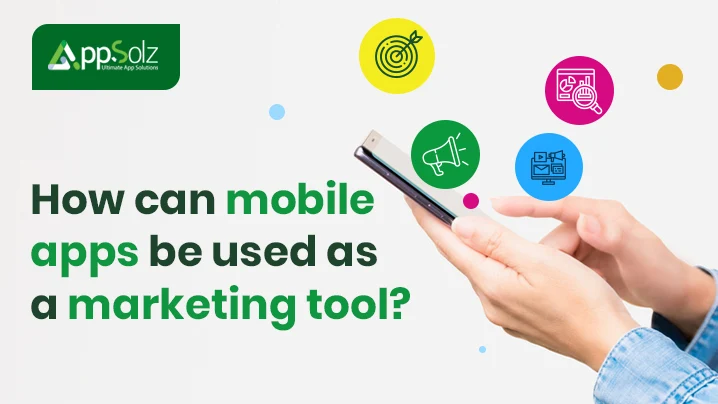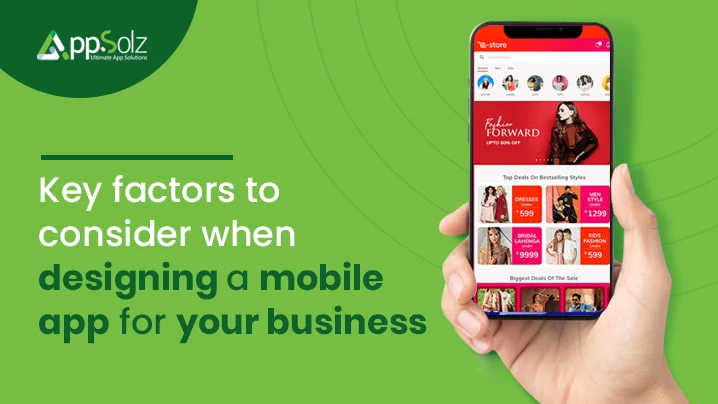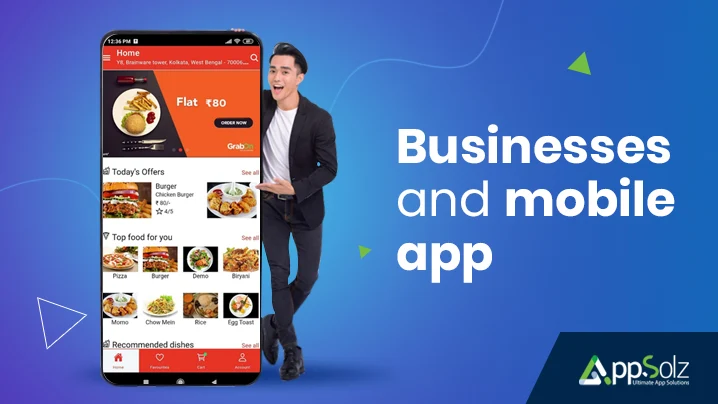- Introduction
- Why is it important for businesses to have a mobile app?
- Uses of mobile apps as business tools
- How can mobile apps be used as a marketing tool?
- Key factors to consider when designing a mobile app for your business
- Conclusion
The mobile market is skyrocketing, and the user base is expanding at a rapid rate of 0.3 to 0.6 billion per year. The growth of smartphone users has fuelled an annual growth rate of 10.4%. As a result, mobile apps have gained popularity as marketing tools. With apps for tablets and smartphones proliferating, they are increasingly appealing to small local businesses.
Individuals today spend a considerable amount of time on several mobile apps on their tablets and smartphones. By marketing new goods and services, limited-time deals, loyalty plans, and other benefits, business owners can draw in new customers and serve their existing clients better. A mobile app also acts as a continuous, real-time line of communication with your clients. Customers can access any information they desire, browse items online, look up locations, check your hours, and communicate online.
Why is it important for businesses to have a mobile app?
Mobile applications can be accessed on the go, and users prefer them because of the personalised impact they have. Although not all small and medium-sized businesses require a mobile app, it could be useful in some circumstances. If SMBs’ (small and medium sized businesses) stay in constant contact with clients, they can benefit by acquiring clients faster. In this way, mobile apps can support brand loyalty and manage business relationships. Additionally, they can enhance marketing initiatives, customer analytics, and ease online shopping. Keep reading to explore the benefits of a mobile app for businesses and how they help in the expansion of a company.
- Customer loyalty:
Companies that compete in extremely competitive market segments must work harder to build a loyal consumer base. They may benefit from mobile apps since they have the potential for repeat business. They can also increase the adoption rates for new goods and services. Mobile apps make it easy for SMBs and their clients to communicate both ways.
Easy communication fosters improved engagement, which enables organisations to track client habits over time and modify their marketing tactics. As a result, a company is better able to predict growth with a loyal client base. Improved forecasting enables companies to customise their offerings and develop goods and services that meet customers’ needs.
- Marketing programmes:
Marketing initiatives assist companies in informing clients about new goods and services. Since they require a proactive installation effort on the part of potential customers, mobile applications enhance marketing and promotional activities. In other words, applications expand the marketing reach of a company by attracting quality leads.
The use of the app can then be tracked by marketing teams, who can subsequently use promotional tactics to target consumers depending on their app usage. Small to medium-sized enterprises (SMEs) may rapidly switch between several initiatives and establish marketing campaigns with the use of mobile apps.
- Convenient online shopping:
According to recent data, shopping online has started to gain ground. Mobile devices, especially smartphones, are personal by nature. The apps offer a more intimate way to search, communicate, shop, and entertain oneself. When choosing and ordering goods and services in the digital era, clients need flexibility. Mobile applications can be created by businesses to inform and manage in-app purchases. In the early 2010s, companies started allowing clients to place orders through mobile apps. Customers were previously hesitant to order products from apps, especially expensive ones.
However, as consumers gained confidence in using their smartphones to make purchases, most of them began to prefer this channel. In fact, a Statista analysis found that the number of orders made via mobile devices increased by more than 20% during the third quarters of 2020 and 2021. Apps for mobile commerce that aim to enhance mobile shopping experiences typically offer enhanced functionality or user interfaces that complement the fundamental buying experience. Several mobile apps for online shopping enable customisation through search and features like carousels. These processes not only personalise the entire experience but also make it easier for customers to make choices.
- Enhances brand awareness and visibility:
Mobile applications are a wonderful way to maintain brands in front of an evolving market. As they offer huge returns on investment, mobile apps have become the preferred tool for both consumers and businesses. Companies frequently search for a powerful channel through which they can promote their brand. Applications improve brand recognition and visibility and can purposefully grow the clientele. Once a mobile application is installed, users will regularly see the brand’s logo, increasing visibility and awareness. The more frequently a user uses a brand’s app, the faster they buy things and use services.
Make sure your app has all the features your target audience is looking for if you want people to talk about how unique it is. Users should be engaged with the app and come back for more. The more users engage with an app, the greater the likelihood of a purchase.
- Maintains an omnichannel presence:
An app with an omnichannel presence enables a company to communicate with clients across a variety of channels, including social media, messaging, email, phone, and in-person. A seamless and uniform consumer experience across all touchpoints, regardless of the channel or device used, is the aim of an omnichannel presence. For instance, a retailer might have a mobile app that lets customers explore and buy products, as well as social media accounts that interact with people and offer customer service.
The app might potentially provide in-store pickup and incorporate the company’s reward programme. This engages consumers and increases customer loyalty by providing a consistent experience across all channels. An app with an omnichannel presence is a useful tool for companies wishing to forge close bonds with their clients and get an edge in the current digital marketplace.
- Customer relationship monitoring:
Several businesses often struggle to understand the mindset of their customers. Businesses have long relied on customer surveys to monitor customer relationships. However, with the proliferation of mobile devices, businesses have acquired the added advantage of gleaning information from apps. They can monitor how customers utilise the platforms, determine the promotions they might be interested in, and review the unsolicited and solicited feedback. This information can help build and maintain a positive relationship with the customers.
All customer interactions, including purchases, questions, complaints, and feedback, may be tracked by apps and kept in one location. Businesses can use this information to create more personalised encounters in the future by having a thorough understanding of the preferences and history of each consumer. Applications can gather and examine user information, including demographics, activity, and preferences, to learn more about their wants and preferences.
This can assist companies in customising their products to satisfy client expectations and enhance their entire experience. Customers can receive real-time feedback from apps, including order confirmations, delivery notifications, and updates on support requests. To give quick and effective help, apps can feature a variety of customer support alternatives like chatbots, knowledge bases, and in-app messaging. This facilitates quick and efficient customer issue resolution for enterprises, enhancing client retention and lowering churn.
Uses of mobile app as a business tool:
Mobile applications can be effective management tools for a variety of corporate processes. These are a few instances of how mobile apps might be used in the workplace:
- Handling customer accounts: Customers can simply check and update their information by using mobile apps to create and maintain accounts. This can assist companies in keeping track of their clients and delivering a more personalised experience.
- Customer feedback gathering: Businesses can use mobile apps to gather input from clients, which can help them improve their goods and services. Surveys and reviews that are integrated into the app can be used to gather feedback.
- Inventory control: Mobile apps can be used to control inventory, giving companies real-time access to their stock levels. Businesses can use this to make sure they always have the right products in stock, which can enhance client satisfaction.
- Sending push notifications to customers: Push notifications can be sent to customers using mobile apps, informing them of updates to existing products, exclusive offers, or other pertinent information. This can assist companies in informing and engaging customers.
- Handling employee schedules: Employees can examine their schedules, request time off, or switch shifts using mobile apps that are used to manage employee schedules. By doing so, firms may more effectively manage their staff and guarantee that the appropriate personnel are always present and in the right locations.
How can mobile apps be used as a marketing tool?

Mobile applications can be an effective business tool for several reasons, such as:
- Increasing customer engagement: Mobile apps can be used to engage customers by creating tailored experiences, facilitating real-time contact, and providing easy access to information about products and services.
- Increasing customer service: Customers may simply access account information, make payments, track orders, and receive alerts and notifications with the use of mobile apps, which can offer 24/7 customer care.
- Boosting sales and income: Mobile apps can be used to promote specials and discounts, showcase goods and services, and make it simple for clients to place orders and pay.
- Streamlining business operations: Routine chores like inventory management, appointment scheduling, and invoicing may be automated via mobile apps, which can help firms save time and money.
- Data gathering and analysis: Businesses may use mobile apps to collect information on consumer behaviour and preferences, which can help them develop better marketing, sales, and customer service plans.
- Facilitating communication and collaboration: Mobile apps can be used to promote communication and collaboration among staff members, business partners, and clients, which can make businesses run more smoothly and productively.
Key factors to consider when designing a mobile app for your business:

- Research:
The first thing you need to know is whether you have a wonderful idea to create an industry-leading mobile application for your company. It is important to do market research before adding a technological touch to your company’s app. It can be extremely helpful to gain insights from a market study report. Additionally, you must be aware of the strategies incorporated by your competitors to immediately optimise your app.
- Identify the target audience:
This is crucial and falls under the research phase. It is important to choose the right audience before starting to design your app. The customers you identify are crucial to the development of the app as well as the extension and growth of its features. Before you start to develop, it is important to determine your target audience and how it will improve their lives. Once it reaches the right audience and fulfils the expectations of your users, it will increase your revenue.
- Select the right platform:
The platform you choose to deploy on is one of the most vital things to consider. It is recommended to start with one platform. The most well-known platforms are iOS, Android, and Windows. You must consider various determinants whilst selecting the right platform for your mobile application, including the app’s target audience, pricing plan features, etc. The next step is to select the development methodology for your business app, which can be either native, mobile web, or hybrid.
- Set a plan of action:
It is crucial for you to comprehend the entire process before designing your mobile application. A fully functional business app requires diligence and meticulous planning whilst passing through several phases. It is important for the business owner to set a course of action to be strategised later.
Project management, design, curating app architecture, development, app testing, app enhancement, and app deployment are the key phases of every mobile application. Develop a strategy for how you will build your app. Release a beta version of your product and put it through rigorous testing and evaluation before making it widely accessible to end users.
- Know the budget:
A corporate mobile app involves knowledge, planning, and optimum management of finance. It is crucial to know your budget and delegate it across the phases of app development. This helps business owners plan their budget for app development, maintenance, upgrades, and advertising.
- User experience:
One thing you should never forget is that the user experience is the backbone of any application. Why do people pick one brand over a competing, similar brand? This is because they believe the selected brand has something distinctive to offer. Mobile applications are the easiest way to turn leads into potential consumers and the finest approach to engaging your audience.
People tend to quickly get bored with a single activity. Due to the diverse options available, app consumers want to be provided with something new and innovative. As a result, it is recommended to produce novel techniques or features and prevent your users from going anywhere else.
Conclusion:
Businesses can gain from mobile apps in several ways, including better brand recognition, enhanced client involvement, and quicker sales procedures. They may boost customer satisfaction, streamline processes, and spur expansion by utilising the advantages of mobile apps. Given the expansion of the mobile app market, the query now is “how to construct the best mobile app for my business,” rather than “does my business require a mobile app?” And for this reason, it is recommended that you get in touch with a professional mobile app development company that can advise you on the best course of action. Get qualified and experienced mobile app developers to assist you with planning, developing, and deploying a mobile solution tailored to your business needs. Discuss your requirements with the professionals and let them guide you through the process.


 March 20, 2023
March 20, 2023

